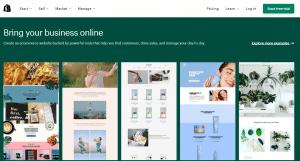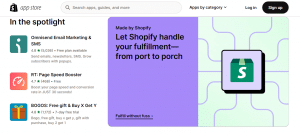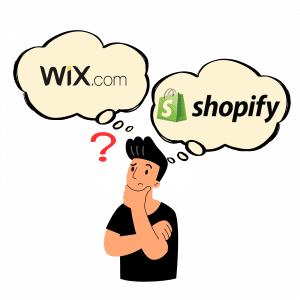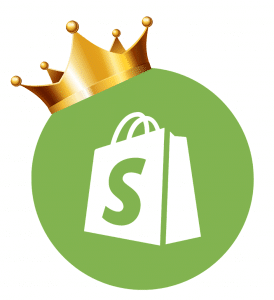Shopify vs Wix: A Quick Guide for E-commerce Newbies

Choosing the best platform is crucial if you want to start an e-commerce business.
You want a platform that:
- Fits your budget
- Covers all the necessary tools and features
- Is easy to use for you and your customers
- Streamlines inventory management, order fulfillment, and payment processing
If Wix or Shopify popped into your head as you were reading, we can’t blame you.
They are easily two of the biggest e-commerce platforms in the industry.
We see them everywhere in ads and YouTube sponsorships—you might even have bought from a Shopify or Wix store once.
But which platform should you work with for your own e-commerce business?
In this article, we'll take a closer look at Shopify and Wix to help you decide which one is the best fit for your e-commerce needs.
Let’s get started!
Shopify vs. Wix: A Quick Comparison
Here’s a quick comparison of Wix’s and Shopify’s relevant features for e-commerce stores:
| Feature | Wix | Shopify |
|---|---|---|
| Costs | Starts as low as $17/month | Starts at around $20/month |
| E-Commerce Tools | Basic | Advanced |
| App Store | Limited selection | Extensive selection of third-party apps |
| Website Design | Easy, drag-and-drop design with hundreds of templates readily available | Customizable but limited choices for templates |
| Customer Support | 24/7 customer support is only available via email and phone | 24/7 customer support is available via email, phone, and chat |
| Payment Gateway Systems | Not optimized for e-commerce businesses | Fully optimized for e-commerce businesses |
Is Shopify Better than Wix?
Shopify and Wix are both great e-commerce platforms. So picking out the best of the two won’t be as straightforward.
The best platform for your e-commerce business will depend on your individual needs and priorities.
So let’s take a closer look into what Shopify and Wix have in store for their users.
What Is Shopify?
Shopify is a popular e-commerce platform that offers a range of features to help businesses manage their online sales.
One of the biggest advantages of Shopify is its ease of use—the platform is very user-friendly, making it easy even for non-technical users to set up and manage an online store.
Additionally, Shopify offers a wide range of features, including tools for managing inventory, processing payments, and fulfilling orders.
Another advantage of Shopify is its large app store with hundreds of add-ons and integrations, allowing businesses to customize their online stores and add additional functionality as needed.
Just recently, Shopify announced that they will be working closely with Melio to provide merchants with a more seamless payment experience.
Melio is a payment processing platform that enables businesses to easily manage and pay their bills, while also streamlining their accounts payable processes.
Through this partnership, Shopify merchants will have access to Melio's payment platform, allowing them to make and receive payments directly within their Shopify account.
With Melio, Shopify merchants will be able to pay their bills and vendors, schedule payments in advance, and even earn rewards for using the platform.
Additionally, Melio's payment platform is designed to be user-friendly and intuitive, making it easy for merchants to manage their accounts payable without the need for extensive financial knowledge or expertise.
Overall, this partnership between Shopify and Melio will make it easier for merchants to manage their finances and streamline their payment processes.
By providing a simple and effective payment solution, merchants can focus on growing their businesses, while leaving the financial management to Melio.
Shopify also offers a range of pricing plans to suit different budgets, although it can get expensive quickly for businesses that are just starting out.
| Basic | Shopify | Advance |
| $25/month | $65/month | $399/month |
| Basic reports | Professional reports | Custom report builder |
| Up to 1,000 inventory locations | Up to 1,000 inventory locations | Up to 1,000 inventory locations |
| 2 staff accounts | 5 staff accounts | 15 staff accounts |
| Basic performance reports | Standard performance reports | Advanced performance reports |
| Fraud analysis | Fraud analysis | Fraud analysis |
| Abandoned cart recovery | Abandoned cart recovery | Abandoned cart recovery |
| Third party calculated shipping rates |
One of the main drawbacks of Shopify is its cost—while there is a free trial available, the platform's pricing plans can get expensive quickly, especially for businesses just starting out.
Shopify’s rates start at around $20 and can get up to $300. Some of the more useful apps can also add to the cost of using the platform.
Despite these drawbacks, Shopify is a popular choice for many e-commerce businesses due to its ease of use and robust set of features.
Pros
- Designed specifically for e-commerce
- User-friendly interface
- Extensive app store with hundreds of options to choose from
- E-commerce sellers can find a robust set of e-commerce features
Cons
- Can be too expensive for smaller businesses
- The steep learning curve for beginners in e-commerce
- Limited flexibility for website design
- Adding apps and features can easily increase the monthly or annual fees
What Is Wix?
Wix was launched in 2006, the same year as Shopify, but it has more users than the latter.
Wix is a popular website builder offering various features to help businesses and individuals create professional-looking websites.
One of the biggest advantages of Wix is its flexibility—the platform offers a wide range of design templates and customization options, making it easy to create a website that is tailored to your specific needs.
Another advantage of Wix is its budget-friendly pricing options aside from offering a free plan.
| Business Basic | Business Unlimited | Business VIP |
| $17/month | $25/month | $35/month |
| Accepts secure online payments | Accepts secure online payments | Accepts secure online payments |
| Manage transactions | Manage transactions | Manage transactions |
| Custom domain | Custom domain | Custom domain |
| Free domain for 1 year | Free domain for 1 year | Free domain for 1 year |
| Unlimited bandwidth | Unlimited bandwidth | Unlimited bandwidth |
| Up to 25 lead capture forms | Up to 75 lead capture forms | Up to 150 lead capture forms |
| 20 GB storage space | 35 GB storage space | 50 GB storage space |
| 24/7 customer care | 24/7 customer care | Priority customer care |
| Customized reports |
While there are premium plans available with additional features, Wix offers a free plan that allows users to create a basic website without paying a dime.
Wix’s Business and eCommerce Plans start as low as $17 per month and no higher than $40 per month!
This makes Wix a great option for businesses and individuals who are just starting out and have limited budgets.
Wix's user-friendly interface is another major advantage.
Even users with little to no technical experience can easily create a website using Wix's drag-and-drop editor.
Additionally, Wix offers a range of helpful resources and tutorials to help users get started and make the most of the platform.
One of the main drawbacks of Wix is its limited e-commerce functionality.
While the platform does offer some e-commerce features, it is not specifically designed for online sales in the same way that Shopify is.
Additionally, Wix's app store and integrations are more limited than Shopify's, which can make it difficult to add additional functionality to your website.
Despite these drawbacks, Wix is a popular choice for businesses and individuals who are looking for a flexible, user-friendly website builder with budget-friendly pricing options.
Whether you're looking to create a simple blog or a more complex website, Wix is definitely worth considering.
Pros
- Tons of flexibility in design and website building
- Budget-friendly deals
- An extensive array of website templates to choose from
- User-friendly interface
Cons
- Not the best platform to grow your e-commerce business
- The platform is not specifically designed to handle online sales
- Limited app store and integrations
Sign-Ups and Accessibility
Are Wix and Shopify available for business owners outside of the United States?
Of course! Both Wix and Shopify are available for anyone who wants to create a website, online store, or start/grow their e-commerce businesses.
However, countries and regions that are classified as ‘restricted’ by the United States Office of Foreign Assets Control (OFAC) will not be able to access Wix’s and Shopify’s perks and services.
Documents and Permits
When it comes to the necessary documents and permits, Wix and Shopify aren’t that much different.
Here are some documents you may be expected to submit:
- Business License and Tax ID
- Domain Name
- SSL Certificate
- Product Information
- Payment Gateway
- Shipping Details
- Return Policy
- Privacy Policy
- Terms of Service
You may also need other documents such as your business address and company logo.
The documents and information required to set up your e-commerce store may vary depending on the specific platform you choose and your unique business needs.
Both Shopify and Wix have user-friendly platforms for building e-commerce stores.
However, if we are simply talking about the ease of setting up your site, then Wix will be your best friend.
Because Wix is a general website builder with some e-commerce capabilities, it already has hundreds of templates to choose from and all you’ll have to do is to drag and drop elements and change the text.
Shopify, on the other hand, is a dedicated e-commerce platform that is designed specifically for online stores.
As such, it will have more tools and features tailored to the needs of online retailers like you.
Making the Choice
For people who are still dipping their toes in e-commerce, Wix is probably the better option.
You don’t need to use a lot of coding—in fact, you don’t need any coding knowledge at all!
The platform offers an intuitive drag-and-drop interface that makes it possible for users to create professional-looking online stores within a few hours.
But if you are planning on doing e-commerce for the long haul, then Shopify is the way to go.
It doesn’t have the same drag-and-drop feature that Wix has, but it’s still an easy-to-use platform with all the right tools sellers like you need to build and manage a growing online store.
They have excellent customer support and tons of free resources to help new e-commerce stores get started on the right track.
If you've given both Wiz and Shopify a try in the past and didn't get the results you intended, here are some alternatives
-
- Weebly
- IONOS
- Sellfy
- WooCommerce
- BigCommerce
- Adobe Commerce (Magneto)
- Volusion
Frequently Asked Questions
Which is more beginner friendly, Shopify or Wix?
Shopify and Wix have both developed management systems that are simple and easy to understand for all their users. However, usability when it comes to beginners would fall to Wix thanks to its simplified site editor and ready to use online store templates.
What does my business gain from using a website builder?
A website builder helps you develop an online presence. Depending on your business’s budget, Shopify and Wix both have features that will help you build a successful website to satisfy the necessities of your business.
What are the differences between Shopify and Wix?
Between the two website builders, Wix is more ideal for small businesses since they offer a free plan and website builder. Shopify does not.
When it comes to selling goods on the platform, Wix is limited to a 1GB file size limit while Shopify's limit is at 5 GB.
The Verdict
So which platform wins?
Despite being both great platforms, we will have to crown Shopify as the winner.
Their platform may need a bit more time and financial investment, but it’s hard to beat a platform that is specifically designed to help users start and grow their e-commerce businesses.
While Wix has some e-commerce features, Shopify offers a more comprehensive range of features and tools, including advanced inventory management, abandoned cart recovery, and built-in SEO optimization.
Additionally, Shopify provides a more robust payment gateway system, allowing businesses to easily accept payments from multiple channels.
With Shopify's extensive app store, businesses can also easily integrate with third-party tools and services to streamline their operations and grow their online store.











